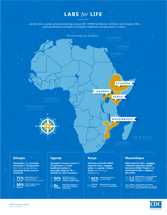Human Resources for Health
Building a Sustainable Local Public Health Workforce
Effective public health systems depend on a trained and motivated workforce to carry out the services needed to achieve health goals. CDC works with U.S. Government partners, host governments, MOHs, non-governmental organizations, universities, and the private sector to establish a sustainable public sector health workforce globally.
Establishing sustainable public health workforce capacity is more than just training—it requires strengthening a complex system of human resource dynamics, including: planning and management of the health workforce; producing new health workers through pre-service education; ensuring adequate recruitment into the public health system; improving the quality of training, mentorship and supervision; and providing appropriate retention incentives.
CDC’s highly trained medical officers, public health advisors, epidemiologists, health economists, behavioral scientists and laboratorians offer unique technical and scientific expertise to strengthen sustainable public health workforce capacity in over 80 countries.
CDC Areas of Strategic Focus
Human Resource Information Systems ─ CDC helps MOHs establish surveillance and informatics systems that routinely track the production, registration, and deployment of the health workforce. The data from these systems help MOHs make evidence-based decisions on strengthening the health workforce.
Pre-service education ─ CDC is helping to establish schools of public health, medicine, nursing, laboratory science, and other disciplines – in many settings where none existed before. CDC supports improving curriculum, faculty training, infrastructure strengthening, and student scholarships.
Training and mentorship ─ CDC supports a wide range of long- and short-term training and mentorship activities, including: helping MOHs to establish their own two-year Field Epidemiology and Laboratory Training Programs, pairing U.S. state health officials with host government counterparts for ongoing bi-directional learning, and co-locating CDC staff at MOHs. Where possible, CDC strengthens indigenous training institutions to foster sustainability of training efforts.
Retention and performance ─ CDC helps countries develop policy for, and implement, 'task-shifting' of service delivery to lower level staff, to maximize scare resources and sustainability of the health care system. CDC also improves health worker retention at local and national health facilities by making significant investments in infrastructure improvement; ensuring adequate medication, equipment, and supplies; improving workplace safety; and improving communication, mentorship, and supervision.
Notable Accomplishments
In 2008, new legislation for the U.S. President’s Emergency Plan for AIDS Relief (PEPFAR) called for special emphasis on producing a sustainable public health workforce globally to provide HIV/AIDS services, and specifically to produce 140,000 new health workers by 2013. Examples of how CDC contributes to PEPFAR’s goal to produce sustainable public health workforce capacity include:
- In Botswana, CDC supports faculty development in the premier diploma programs for nursing, lab and pharmacy technicians, and health educators. CDC is also helping to establish a school of public health and a program to upgrade laboratory technicians to a degree program to strengthen laboratory practice in the country.
- In Kenya, CDC worked with Emory University to establish the first Human Resource Information System (HRIS) in sub-Saharan Africa, which collects registration and deployment data on health care workers on a quarterly basis from more than 6,000 health facilities nationwide. The data produced has been used to impact policy and program decisions by the MOH, such as to successfully extend the retirement age across the whole civil service, including nurses, by five years, and has been replicated across the continent.
Labs for Life Infographic:

Get email updates
To receive email updates about this page, enter your email address:
Contact Us:
- Centers for Disease Control and Prevention
1600 Clifton Rd
Atlanta, GA 30333 - 800-CDC-INFO
(800-232-4636)
TTY: (888) 232-6348
24 Hours/Every Day - Contact CDC-INFO
 ShareCompartir
ShareCompartir


